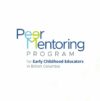“Sometimes knowing that it is a confidential space allows for more freedom of sharing”
“Often with childcare you get very siloed with I work here and I work there, and this group really surpassed that, and we made, you know, even if our philosophies were a little bit different, we had so many things in common, and it was really humanizing to recognize that, and empowering to recognize that.”
“The confidence to be able to step forward to look at myself, to see myself and say that you can keep on doing this – I’ve always looked at the kids as my bosses, but not realizing that I don’t have the support behind me to keep on continuing on to this.”
“In the end, I had a different lens to see my daughter’s kindergarten teacher and elementary school teachers differently, because she (my peer-mentor) explained to me what it was like to be a teacher in the classroom, and it had [helped] me have a bit more compassion”

Opening space: One strong reflective essence I felt during our connection was that we both showed up fully as we were in the moment. We opened space for each other to share what we were going through. It felt like two Warriors of Light coming together to support each other. We shared similar feelings of how challenges in the field were presenting themselves and provided suggestions and insights to each other for possible solutions. It was a heartfelt and genuinely beautiful time shared together.
Dominic
